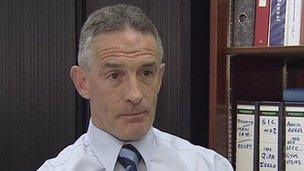Prisoner Ombudsman: Shortfalls in Frances McKeown's care
- Published
The Prisoner Ombudsman has found there were "serious shortfalls" in the care of an inmate who took her own life.
Frances McKeown, 23, died in Hydebank Wood in south Belfast in May 2011.
She had suffered severe mental health problems for a number of years and had told prison staff and health workers she intended to kill herself.
The Prisoner Ombudsman, Pauline McCabe, said Ms McKeown did not see a psychiatrist until more than six months after she went into the prison.
Mrs McCabe also said there was evidence other inmates bullied Frances McKeown after they believed she had told prison staff she saw a male officer kissing a female prisoner.
But the ombudsman said it was "unlikely" that the bullying was a "direct cause" of her death.
However, Mrs McCabe said the prison authorities' investigation into Frances McKeown's allegation was "wholly inadequate".
As a result, the governor of Hydebank Wood was suspended and charged with misconduct.
He is not named in the report, but he is Gary Alcock, who is now working elsewhere in the Prison Service.
'Failures'
His old job has now been advertised.
Ms McKeown was in jail awaiting sentencing after being convicted in relation to a hijacking.
She died on the same night as another prisoner, Samuel Carson, took his life in another part of Hydebank Wood.
Ms McKeown kept a journal and wrote letters in jail, in which she recorded details of suicidal thoughts and criticised the prison's healthcare regime.
They were found after her death and extracts from her writings are included in the ombudsman's report.
Ms McKeown's husband Brian has said that while the Prisoner Ombudsman is right to acknowledge the efforts which staff made to support his wife, he is "deeply distressed" by "glaring failures".
He is planning to sue the authorities.
Mrs McCabe identified 18 "matters of concern" for the South Eastern Health and Social Care Trust and the Prison Service.
The trust has said it accepts the report's findings and has made a number of improvements to prison health care.
These have included establishing a mental health team working across Northern Ireland's three prisons and recruiting additional staff.
Brendan Whittle, director of adult services and prison healthcare at the trust, said that on the day before she died, Frances had received one-to-one counselling which was "reported to have gone well" and gave "no indication that she was about to take her own life".
"The prison is not a hospital and the prison healthcare service is not a hospital within the prison. It's simply nurses and doctors doing their best to care for people in a very difficult setting," Mr Whittle told BBC Radio Ulster.
'Vulnerable'

Gary Alcock was suspended as governor of Hydebank Wood prison in May
He said that posed "a much broader question" about "whether or not someone in Frances' circumstances should be committed to prison in the first place".
However, Mr Whittle said it was not a question for the trust to answer.
"We know from history how hard it is to prevent someone taking their own life when they want to do so, and this is even harder when someone is in custody - especially someone so vulnerable as Frances, with a troubled past.
"Within healthcare in prisons we can mitigate the risks - and the reforms that we have put in place will help us to do that - but we can never eliminate the risks," Mr Whittle added.
The Prison Service has also said it is addressing the issues in the report, especially the ombudsman's concern that Frances McKeown was locked up too much.
Director General Sue McAllister said: "I recognise that lock-downs cause difficulties for some prisoners, particularly those who are vulnerable.
"It is my intention to work with governors to reduce the amount of lock downs to an absolute minimum and only use them as a last resort."
- Published2 August 2012
- Published14 May 2012
- Published5 May 2011